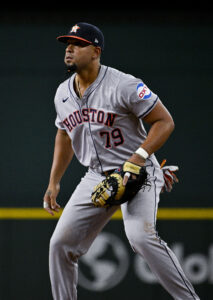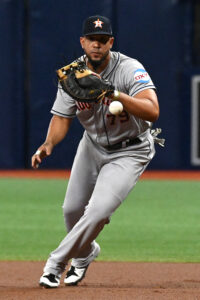No hitter has had a worse start to the season than José Abreu. The veteran first baseman has only picked up four hits in 65 plate appearances. He’s hitting .068/.138/.085 with one extra-base knock, a double. Among hitters with 50+ trips to the dish, none has made less of an impact from a power perspective. Only Victor Scott II — a glove-first rookie whom the Cardinals optioned over the weekend — has as poor an on-base mark.
While St. Louis had the luxury of sending Scott to Triple-A, the Astros can’t do the same with Abreu. He’d need to agree to any kind of minor league assignment. They’re not going to find a trade partner. In all likelihood, the only way for Houston to take him off the MLB roster is to release him and eat the remaining money on his $58.5MM free agent deal. Considering Abreu is making $19.5MM both this season and next, it’s not especially surprising that Houston isn’t ready to move on entirely.

At the same time, they have to at least consider the possibility of making a change at first base. The Astros have already kicked Abreu to the bottom third of the batting order after he started the year in the #5 hole. He has gotten the start in 16 of Houston’s 23 games, with Jon Singleton getting the nod at first base for the other seven appearances.
If Singleton were hitting well, perhaps Abreu would be in danger of losing his starting job. Yet the lefty-hitting Singleton is off to a lackluster .229/.308/.286 line in his own right. It comes as no surprise that Houston’s first basemen have been the sport’s least productive through three weeks. No team has gotten less than their .110/.187/.146 showing over 91 plate appearances.
While Singleton isn’t exactly forcing his way into the lineup, the Astros could consider alternatives in the minors. Offseason trade acquisition Trey Cabbage is on the 40-man roster but has been on optional assignment to Triple-A Sugar Land all season. He’s hitting .262/.407/.492 over his first 18 games. Former seventh-round pick Joey Loperfido has raked at a .260/.359/.688 clip over 19 contests for the Space Cowboys. The Duke product is tied with Heston Kjerstad for the Triple-A lead with 10 home runs. Loperfido is not on the 40-man but will need to be added at some point this year if Houston wants to keep him out of next offseason’s Rule 5 draft.
Neither Cabbage nor Loperfido is certain or even necessarily likely to produce against big league pitching. Cabbage appeared in 22 games for the Angels last season and struck out in nearly half his plate appearances. He’s going down on strikes a third of the time this year in Triple-A. Loperfido has had a similarly high swing-and-miss rate, fanning at a 33.7% clip this year after running a 32.6% strikeout percentage in his first look at Triple-A pitching last summer. He’s soon to turn 25 and has yet to make his major league debut.
Even if the Astros aren’t sold on Loperfido or Cabbage making enough contact to produce at the MLB level, they’ll obviously need to see more from Abreu to continue running him out there. General manager Dana Brown acknowledged as much last week. The GM told Matt Kawahara of the Houston Chronicle on Friday that while the Astros would continue to give Abreu playing time in hopes that he finds his stride, they’d “have to circle back and make some decisions” if the former MVP doesn’t start hitting. That preceded an 0-8 showing from Abreu in the first two games of their weekend series against the Nationals. Singleton got the nod in yesterday’s series finale and went 0-3.
A player starting the year slowly can easily be overemphasized. A terrible three-week stretch to begin the season is more visible than a similar run in the middle of the summer might be. Teams are understandably wary about overreacting to a small sample in April, as Brown noted. Abreu’s struggles are magnified, though, because he’s already coming off a disappointing first year.
In 594 plate appearances a year ago, he hit .237/.296/.383 with 18 home runs. Of the 25 first basemen who took at least 500 plate appearances, Abreu was last in OBP and 22nd in slugging. Including this year’s start brings his overall line as an Astro to .220/.281/.354. That’d be subpar production for virtually any regular on a team with postseason aspirations. It’s particularly poor for a 37-year-old first baseman whose main source of value is supposed to be his bat.
To his credit, Abreu found his form to some extent late last season. He carried a .237/.296/.350 mark into September before connecting on seven homers with a .237/.299/.536 line in the regular season’s final month. He built off that in October, mashing at a .295/.354/.591 clip with another four longballs in 11 playoff contests. Abreu has also traditionally been a slow starter, even if this month’s struggles are at another level. For his career, he owns a roughly league average .241/.309/.421 line in March and April; he has posted well above-average offensive numbers in every other month.
That perhaps offers some level of optimism that Abreu will be able to turn things around. Still, despite a strong Spring Training performance, he hasn’t smoothly carried his late-2023 rebound into this season. How much more leeway the front office and manager Joe Espada can afford to give him remains to be seen.
Houston’s offense has been solid overall despite the complete lack of production at first base, yet they’re operating with far less margin for error than they have in past seasons. Poor performances from the starting rotation and the back of the bullpen, combined with a lack of timely hits, have led to a dismal 7-16 start. Only the White Sox have been worse in the American League. Urgency is soon going to mount. If the Astros get to a point where they feel a change in playing time is necessary, first base might be the likeliest position to do so.
Image courtesy of USA Today Sports.
